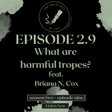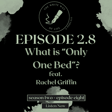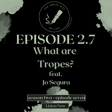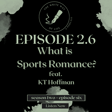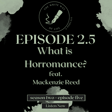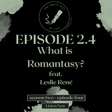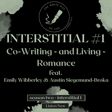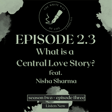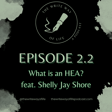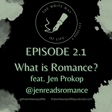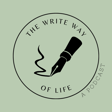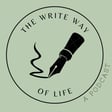Become a Creator today!Start creating today - Share your story with the world!
Start for free
00:00:00
00:00:01

"What is Genre?" featuring Aamna Qureshi - Episode 6- Season One - The Write Way of Life
In this week’s episode, Karis chatted with author Aamna Qureshi, whose fantasies and romances across age categories are truly delightful. Karis and Aamna broke down what genre is and chatted through some of the ways various genre conventions can help or hinder storytelling.
Find Aamna Qureshi online.
Check out Aamna’s books.
Follow the podcast on Instagram or on our website.
Follow Karis on Instagram.
Follow Adi on Instagram.
Transcript
Introduction and NYC Banter
00:00:15
Speaker
Oh no, there is a siren outside. i hope that we can't hear it. Anyway, hello Addie. Hello. I mean, you live in New York City. That's par for the course, right?
00:00:26
Speaker
I know. I just, it that started right as you hit record and my brain just like panicked. But anyway, um my name is Karis Rodgersen and I am one of the hosts of the Right Way of Life podcast.
00:00:38
Speaker
And with me today... Who are you? I am A.D. Giletta. You can call me Addie. ah i forgot that we were going to do this who we are. And that's by that um bullet point in our in our outline for this intro.
00:00:53
Speaker
um But that's correct. I just sent you the outline for the intro that says, who are we? No, I did read that. And and um I thought it was more an existential question. But we also had a conversation earlier this week where you were like, we should introduce ourselves at the beginning of every episode so that people know who we are.
00:01:10
Speaker
If they haven't gone through our entire podcast discography. Discography? Discography. Discography. Yeah. No, it's I've been I listen to a lot of podcasts every day and I'm like picking up like tips and like things that I want us to start doing in our podcasts. And we're constantly improving.
00:01:28
Speaker
Life is an adventure. Whatever. the siren is gone. Yeah. We're getting better and better every day. Every day, I hope.
Easter Humor and Misconceptions
00:01:38
Speaker
um But yeah, so it is currently Sunday, April 20, 420. Hashtag lays a ahag glazer Or, you know, ah what's the holiday that there's a big one that involves? my god, yeah, it's Easter. Yeah, yeah Jesus' his day, as my roommate said.
00:01:58
Speaker
I briefly thought that there was also fire related to Easter, um but because they, I was like, did they burn him at the cross? But that's... Oh my God. That would be so much worse. No.
00:02:09
Speaker
The cross, um listen, we're not going to get too deep into it, but the cross is like, has haunted my nightmares since I was a wee child. I was in first grade or...
00:02:21
Speaker
kindergarten and we were watching like this dramatization of Jesus's life on the VHS and I was sitting in our little apartment in Perugia, Italy and I was like, oh my god, they're going to crucify me.
00:02:36
Speaker
No. Why? What? No. Not anymore. It's That's gone out of fashion. Absolutely. Well, that's how it stays out of fashion. i think so. I think if anything's going to come back, it's going to be the guillotine.
00:02:50
Speaker
Well, I don't want that either, but it is significantly less ah gruesome. Well, maybe it's it's gory, but it's not as painful. Yeah, it's quick and easy. Anyway,
Celebrity Mix-Up Story
00:03:02
Speaker
sorry. So this is the Right Way of Life podcast.
00:03:05
Speaker
We do talk about writing. bombed Before we dive in, i have the funniest story that just happened not 15 minutes ago. I'm very excited.
00:03:16
Speaker
She's going to kill me, but it's okay. I told my roommate I was sharing it. I'm talking to my roommate. I'm gay. She's straight. We're talking about men she finds attractive, and she's, like, listing them off. She's, like, this one and that one, and then she goes Ben Kingsley.
00:03:31
Speaker
And was like, who's that? So I Google. I type in Ben Kingsley. She's like, he's a little older. I'm like, okay. I'm expecting, like, 50s. What pops up is a bald 80-year-old man.
00:03:42
Speaker
sir ben kingsley and i look at her and she looks at me and goes that might not be his name and she's like it's got kingsley in it though so i just changed my google search to kingsley and it's kingsley ben adir who is a 38 year old very attractive man go to his wikipedia page top of the top of the page first thing you see not to be confused with ben kingsley is this a safe space sure why I think they're both hot. knew that's where this was going. The second you said is this is a safe space, I was like, they want the ADO. Yeah. I mean, Ben Kingsley can get it.
00:04:17
Speaker
After I saw him in Iron Man 2, Iron Man 3, he was in Iron Man 3, and he had a very complicated bet. He also shows up in some other Marvel things.
00:04:31
Speaker
But I love Ben Kingsley. Like, guilt right there.
Book Recommendation and Queer Dating
00:04:37
Speaker
Anyways, I think that if this were video and it would be really funny because my mouth just like opened and closed like five times like a fish. um At gilf.
00:04:48
Speaker
My God, you need God. We all do. No, no. Anyway.
00:04:59
Speaker
who What have you been reading this week, Addy? What have I been reading? um Actually, oh, fun i have a fun story. and Yeah.
00:05:09
Speaker
Where is the book? Oh, my God. We are going to cut this. take ah Well, I'm going to be the one to cut this together. We'll grab this book. One second. Okay. and I'll narrate what's happening.
00:05:22
Speaker
Adi has stood up. Adi has run to the other side of the apartment. Adi has a book. I'm back. Okay. So the the book that I'm currently reading is called The Crescent Moon Tea Room.
00:05:32
Speaker
But I have a fun story about how I got it, which um I think makes up for the fact that I'm simping over an 80-year-old man. um So i I went on a date with someone yesterday.
00:05:45
Speaker
ah And but it was just like a coffee date. And halfway through the date, which, granted, lasted four and a half hours. But that is that's par for the course with me. I'm queer. They were queer.
00:05:56
Speaker
That's how long queer dates are, you know? oh I mean, or I'm just weird. i Anyways, point is, halfway halfway through the date, they pull out a book and they'll they're like, hey, by the way, I thought you would really like this.
00:06:13
Speaker
And they just hand me a book. Marry them. Which, it was the first the first date. We can't love bomb them. I've already talked... U-Haul.
00:06:24
Speaker
I'm not going to U-Haul. My therapist and I have had long discussions about how to start healthy relationships so that they have solid foundations. Your therapist is harshing my jam right now.
00:06:37
Speaker
I know. I know. It's a bummer. It's a bummer. I'd love to be the person that just like jumps on a plane and is like, marry me. Let's get together. now I couldn't. I don't even know how to...
00:06:51
Speaker
That almost got too much, too real, too fast. Let's go. So I've been reading.
Current Reads and Writing Projects
00:06:56
Speaker
I'm going to share about the three books that I've been reading this week. As some of you may know, I read up to six books at a time.
00:07:04
Speaker
But I'm only going to talk about three of them in the three can the three main categories. So you've got my physical read. I finished Oathbound. Hallelujah. Bro, I was screaming.
00:07:18
Speaker
I was crying. I was shaking. I was throwing up. i threadstead at Tracy Dion to tell her that she has my favorite brain, which I think might be weird of a thing to say.
00:07:31
Speaker
But like, holy forking shirtballs.
00:07:37
Speaker
Your reactions that you're sending me were like so good. Yeah. I was, I, oh, and um I also finished, I'm just going to move on from that.
00:07:50
Speaker
I also finished late last night. I finished um How to Become the Dark Lord and Die Trying, which I think you would also enjoy by Jango Wessler. it is so funny.
00:08:02
Speaker
Had me absolutely howling many a time. And I don't like a Groundhog's Day. Like, I don't like a time loop. Those stories, not for me. This story, very much for me.
00:08:16
Speaker
Ooh, I'm just like reading the overview. It's very like, it's okay. The way I would describe it to people is I'm, it's like a, it's, well, it's a fantasy world, but it's very queer normative and sex positive, but also closed door.
00:08:31
Speaker
So there, there, it's so fun. i mean ah Okay, I'm going to add that my list. Anything that the first, like it it comps, it's Groundhog Day meets Deadpool, which is automatic. not Incredible.
00:08:46
Speaker
I'm also reading For Her Consideration by Amy Spaulding as my adult romance. Which is a sapphic romance set in Hollywood.
00:08:57
Speaker
It's very fun. I'm quite enjoying it. And I'm reading it because I want to use that as a comp for my celebrity romance book.
00:09:08
Speaker
Should that ever be a thing? It will, once you've can once you've completed your writing break. Well, no, I mean, it's I'm waiting to hear back feedback on it, so...
00:09:21
Speaker
It's out of my hands right now. Well, right. Yes, yes, yes, yes. Yeah. but of Speaking of writing, i haven't done anything. What about you? um Yeah.
00:09:33
Speaker
um So I have been continuing on the my little my little rom-com.
Theater to Film Transition
00:09:38
Speaker
um And I also, yeah. yeah So I'm hoping to get that finished by May 31st.
00:09:46
Speaker
So we are onward and upward there. um i also ah today sort of reorganized my apartment. And so I have a sort of new writing space that I think will be more conducive to writing.
00:09:57
Speaker
um and i And I wrote a short film script that I am hopefully going to produce and film this upcoming fall, which is exciting.
00:10:09
Speaker
was so cool. You just are always like, oh, I came up with like a brand new project and now we're just going to do it. but Okay. So in this instance, I think that like... One, a short ah short film is is a much easier ah to do than to write a whole damn book. Like, it's 20 pages. And two, I already work in theater and I'm a production manager in theater. So, like, I know the the ah less fun aspects of actually producing um certain live entertainment.
00:10:40
Speaker
um i've no I don't know anything really about film. So this has been very fun of, like, figuring out the diversity divergence between the two mediums of like, yes, you need lighting and sound, um but it's slightly different equipment in slightly different lingo. um So...
00:10:59
Speaker
But yeah, I figure I might as well just do it because I can. And I've got a friend who is ah is a look is a director and I trust him and he he has a film degree. um And he also works.
00:11:11
Speaker
Yeah. So he's he's very much like, I will ah explain things to you. he He read the first chapter of my script and he was like, I love it. It's great. You do need to actually like format it in a way that is better.
00:11:23
Speaker
and I was like, oh yeah, it's just dialogue at this point, really. And... and like a couple pieces of setting, um which honestly is how I write a lot of ah my works. I just like start with the dialogue and then add. So fascinating. Dialogue I've always felt is one of my like weaker, weaker elements of my writing.
00:11:47
Speaker
So yeah don't let me hone in on it at all. Oof. I, I can't just, I struggled so much with description for like years and years. I would have,
00:12:00
Speaker
One of my best friends, I remember they were reading a very bad book that I wrote that will never see the light of day. And they were like halfway through it. And I was like, what do you think so far?
00:12:11
Speaker
And they were like, well, I love the characters. I can totally, i know who they are. I don't know where though. Like at all. It's like, what do you mean?
00:12:22
Speaker
yeah they were like, just show up and seem to be talking this will come up um in our episode our next episode um but i did mention i think i described it as i just put my characters in like a blank white room and i'm like what do you like what do you mean you need to know where they are just that they're use your imagination no sometimes you do have to give them something right yeah you gotta set the scene as they say um This would be a great segue if this were our setting episode, but it's not.
Introducing Amna Qureshi and Genre Discussion
00:12:56
Speaker
um This is our genre episode. um For this one you will notice that it is back to being just Karis and the guests because Addie, unfortunately, was unable to make it for our marathon day of recordings, which I take off from work back in February. yeah that was we Yeah, we did three episodes in one day and I could not get out of them yet.
00:13:18
Speaker
But um we did, I chatted with Amna Qureshi, who is a well, ah one of us is going to read her bio right now. So. Amna Qureshi is a Pakistani Muslim American who adores words. She grew up on Long Island, New York, in a very loud household surrounded by English for school, Urdu for conversation, and Punjabi for emotion.
00:13:39
Speaker
Much of her childhood was spent being grounded for reading past her bedtime, writing stories in the back of her notebooks, and being scolded by teachers for passing chapters under the tingle. Through her writing, she wishes to inspire a love for the beautiful country and rich culture that informed much of her identity.
00:13:54
Speaker
When she's not writing, she loves to travel to new places where she can explore different cultures or to Pakistan where she can revitalize her roots. She also loves baking complicated desserts, drinking fancy teas and coffees, washing sappy rom-coms, and going for walks about the estate or yard.
00:14:10
Speaker
She currently lives in New York. Look for her on Instagram at Amna Qureshi and Twitter at Amna Qureshi underscore. in Perfect. All right.
00:14:21
Speaker
So we are here on the Right Way of Life podcast with um ah the author Amna Kureshi. um And we're super excited to be chatting with Amna about genre today because I know Amna has written and dabbled, well not dabbled, but like actually written multiple genres and i think age categories too, is that correct?
00:14:43
Speaker
Yes. Okay. So you're like the perfect person chat with about what genre is, like what the conventions are, how to break them, how to jump between, you know, fantasy and rom-com and everything like that.
00:14:59
Speaker
um Yeah, so if you don't mind, my first question is just how you would define genre to someone who's either new to the writing world or someone who has no knowledge of like writing craft and conventions.
00:15:15
Speaker
Yeah, absolutely. um First of all, thank you so much for having me. So happy to be here. um Yeah, so I think genre for me is basically just the foundation of the type of story that I want to write.
00:15:27
Speaker
um i don't consider it as something that is restrictive. It kind of just helps me be in a certain mind frame as I'm approaching the story, um especially when i think in writing any story, it's always good to read within that genre.
00:15:42
Speaker
So a genre is basically just I would say it's a category. um It's basically just a type of story and it has certain elements that you'll find in most types of stories within that genre.
00:15:57
Speaker
Perfect. So let's get like, let's talk about like fantasy, for example. If you're writing in the fantasy genre, what are some things that you would expect to find or to put in your story?
00:16:08
Speaker
Yeah, so for me, I've always loved fantasy. And I think that's also why I've been drawn to it as a writer. And i think the genre itself is so broad. um So even depending on the subgenre, you might find different things within that story.
00:16:24
Speaker
So the way that I approach it is usually with a basis of world building. I think world building is really, really important in fantasy um because you are creating you know, a fantastical world that's maybe different from the world that we live in.
00:16:40
Speaker
um So I think that world building needs to be really strong. And then everything else in the story kind of goes off of that. The world building really exists in the background and creates that foundation.
00:16:52
Speaker
So for fantasy elements, I really love ah strong world building. um Something with that that I also keep in mind is I always love writing stories that draw from like my cultural heritage or like my religious heritage.
00:17:06
Speaker
So then I always love infusing like elements from like Pakistani culture into my fantasy worlds just to kind of flesh it out and make it feel more real and immersive. Yeah.
00:17:17
Speaker
And then other than that, I think fantasy will also include either like magical creatures um or, you know, the main characters having magical abilities.
00:17:29
Speaker
I think there's a lot of really fun things that you can play around with in fantasy. Even like the structure of like these made up countries or like the politics between them, the politics like within the court systems.
00:17:42
Speaker
I think... There's just so much to explore. um and then a lot of times it does become a lot of work for the writer because you have to think about these things and really consider them, even if it's just kind of for like a sentence or like a very short chapter in your story.
00:17:59
Speaker
The story has to feel like it's really thought out and in a lived in world for these things to make sense and for them to be believable for the readers. Yeah, I was having a conversation with another writer friend of mine. Actually, Kat Corpy. She is one of Shayla's clients.
00:18:16
Speaker
um And we were talking about like deep thinking and like how it's something that I've been working on personally, both in my stories and in life.
00:18:27
Speaker
It's like always going a little bit beyond the surface. Right. think that fantasy world building specifically kind of helps you do that. Right. Like it helps you think to not just, OK, what is the political system of this world? But like, why?
00:18:41
Speaker
Right. Like why they have a monarchy. What does that mean? Do people like the monarchy? Like, is it like our real life monarchies? Like, do they have the same problems? Are they better? Are they, you know?
00:18:51
Speaker
um So I really i really love that you started with fantasy and with world building, because I do think that is such a it's one of. It's both an interesting element because it is so crucial to fantasy, but it also transcends genre. Like you have to world build in contemporary as well, right? Like you're going to have to think about where you're putting your characters and like the setting and and the world that they live in.
00:19:18
Speaker
um But yeah, I just think world building is a really exciting like element that I hadn't thought about enough in my first couple years writing these. I was just like, whatever, I write contemporary and I don't have to think about things.
00:19:31
Speaker
Yeah, I think world building is still really important in contemporary stories as well. So even like in my romance novels that are just like contemporary romances, I still have to really create that sense of place.
00:19:44
Speaker
um And it's funny, one of my friends was recently reading um my adult romance novel, If I Loved You Less. And she like sent me like a voice note. She was like, oh, it's like so detailed. Like,
00:19:56
Speaker
Are you only like noticing these things like in like a room or at a party? Like I don't notice these things, but you've included so many details. And she's not really a big reader. um She's just reading my book. She's like my friend.
00:20:08
Speaker
But i was like explaining it to i was like, yeah, you know, as a writer, i have to create an entire world for my readers, whether it's like a fantasy story or a contemporary story.
00:20:20
Speaker
No matter what, it has to feel immersive for the readers. It has to kind of have that element of escapism, I think. So that you really feel engrossed in the story and feel like you're there.
00:20:30
Speaker
So even in a contemporary story, if, you know, that story, if I loved you less, it's that on Long Island, which is, you know, where I grew up, where I live. So it feels kind of silly to include these like everyday details that I interact with on the daily.
00:20:45
Speaker
um But I think that just really helps create that three dimensional sense of the story. Yeah, I think one thing that books can do, that writing can do that's really special is it does, it's like a 2D medium that makes you think in 3D, right?
00:21:03
Speaker
yeah um Because you can picture, you can imagine it, you can smell, you can. Exactly. and Like sometimes when i it's funny too, this is a total aside, but sometimes when I like am reading something and I have a candle burning and it's like a very strong spell, when I smell that later, I i like go back to the book.
00:21:20
Speaker
in my book. Oh, that's interesting. I'll be like, Lavender. Oh, yeah, i remember. I was reading reading, you know, this fantasy novel and they were galloping through the desert and I'm like, what are you doing? Something.
00:21:32
Speaker
Yeah. Yeah. So back to genre. um What are... what are some of your favorite genres to like play around in? And like, what about them? Like you mentioned you're drawn to fantasy. What about fantasy really excites you?
Cozy Fantasy and 'The Baby Dragon Cafe'
00:21:48
Speaker
Yeah. So I love fantasy and I think that is a genre that I really love playing around with, especially recently, um kind of in like the sub genre of like cozy fantasy.
00:21:58
Speaker
i think it's just so fun um as a writer and as a reader. um i feel like I've always been drawn to fantasy because of that, sense of escapism and kind of I've only loved traveling as well so for me reading a really good fantasy book genuinely feels like traveling you kind of lose sense of like where you are and you're immersed in that story um but I think a lot of times fantasy books can be very intense and like hardcore and stressful and you know I love an angsty story as much as anyone else but I think with this cozy subgenre you're able to have all of those classic fantasy elements that you love with a bit of like lower stakes and kind of
00:22:42
Speaker
less stress um so i've been having a lot of fun with that as a writer and um my recent release the baby dragon cafe is you know within that cozy sub genre where it's you know it has dragons but it's not like game of thrones or anything very intense with their dragons um they're they're literally just like very mischievous cute baby dragons you know causing havoc in a cafe and So it was really fun to kind of have that a classic fantasy element like dragons, but then infuse it into this like small town romance um and have the dragon not be a source of like danger or power or anything like that. Kind of just have it be this thing that connects these two people in their romantic journey.
00:23:30
Speaker
So I had a lot of fun playing around with that. Yeah, I love the cozy... like sub-genre of various genres, it feels like it's it's a way to take all of the, like, elements that we love.
00:23:42
Speaker
Yes. And just kind of make them safe. Yeah, definitely. um And I know, you know, given
00:23:52
Speaker
the state of the world, a lot of people are turning to things like dystopian and horror. And I think that that is very valid. Personally, i turn to, like, comfort when it feels like the world is falling to pieces.
00:24:03
Speaker
Yeah, me too. I think I, so I've actually never read like a horror novel. I've never seen like a horror movie. I'm like such a big baby. can handle it. But I love like those comforting reads that really just feel like a warm hug or that kind of just help you unwind and get away from like the chaos of the world and of life, even if it's just for a little bit.
00:24:25
Speaker
um So I really do enjoy the cozy subgenre. And I think that that is the beauty of having multiple genres, right? Is that there'st there's...
00:24:37
Speaker
There's room for everyone to find what they need. Right? Like, that's why we have horror. That's why we have romance. That's why we have sci-fi. Because people are expansive and have so many different interests and, like, ways that they turn stories.
00:24:53
Speaker
I think of, I was on Threads earlier today, which is never a good idea because there's always drama. And someone was complaining about romance and being like, there's too much romance out there. And I was like, well, first of all, you know,
00:25:07
Speaker
you're welcome for bringing in the money to publishing. But secondly, like, that's fine. That just means there's a lot of people who love it. There's not less literary fiction just because there's a lot of rope.
00:25:18
Speaker
I think also it's really funny um when, like, people complain about certain things. Yeah. Because, yeah, not everything is for everyone. um Even sometimes, like, when I'm reading, like, reviews of books that I'm, like, thinking about reading, um i kind of always will read, like, negative reviews as well.
00:25:37
Speaker
And, like, some negative reviews will be like, oh, this had, like, way too much romance. Like, it was not good at all. But for me, I'm like, oh, I love romance. So, like, yeah that negative review is actually convincing me to read this book.
00:25:48
Speaker
um So it's really – it's so subjective. It's just a matter of taste and a matter of finding – the types of books that you'll enjoy. um Because of course, everyone has such limited time, I think, as well.
00:26:01
Speaker
So you should really only read the stuff that you know that you'll enjoy or that you think you have a good chance of enjoying. Like I mentioned, i don't read like in the horror genre because I know that it's not something that I would enjoy.
00:26:13
Speaker
um so like in my limited free time, if I'm going to pick up a book, it probably will be like either a fantasy novel or a romance novel or like some subgenre of the two. Just because I know but that's what I enjoy.
00:26:27
Speaker
Yeah. And I think that's so fair. And we should all wait Make space for people to have different ideas of what is enjoyable.
Genre Conventions and Reader Expectations
00:26:38
Speaker
So when it comes to writing within a genre, right, whether that's fantasy, romance, horror, sci-fi, etc., there tend to be certain certain conventions, right?
00:26:50
Speaker
So those... How would you describe, I guess, like, the the writing convention for, like, fantasy or romance? Like, how would you describe that?
00:27:01
Speaker
not necessarily what the actual conventions are, but like what is genre convention, period. yes I think that conventions are really important as a writer to just like be aware of.
00:27:14
Speaker
I don't think it has to be anything super specific. It should just be kind of this mind frame, or it's just something that you're conscious of. So again, the example of me never reading horror, i don't think that, you know, tomorrow I could just sit down and write a horror novel because I've never read it. I don't know any of the conventions of the genre.
00:27:34
Speaker
I don't know what's typical in a horror novel, you know, what would be expected, you know, things that fans of the genre will go into a story basically expecting. I think that's what the conventions are.
00:27:46
Speaker
on So like an example of that is like in a romance novel, a very big convention is that it has to have a happily ever after. and so And that's something that romance readers are aware of.
00:27:57
Speaker
So when you pick up a romance novel, that's what you're expecting. But if somebody has never read a romance novel or interacted with the genre or the conventions of the genre and they you know write a romance novel without a happy ah ending it would upset a lot of readers because that's you know going against what the the genre is kind of like there for it um so yeah so i think conventions are just a good reference point to have in mind as you're writing um
00:28:29
Speaker
Just so that you don't create something that is different from what readers are expecting. I think a lot of times the struggle with readers and like books is that a lot of times books can be marketed wrong or they're portrayed in a certain way.
00:28:48
Speaker
So readers go in with certain expectations and then when they read it, the book is completely different. And then that's kind of what there's like the disconnect. And then that's what like kind of upsets them.
00:28:58
Speaker
I mean, I feel like that's happened to me as well, where like a book will be marketed perhaps like as like, I feel like this happens with book talk a lot too, where books will be marketed as like, um like romanticy books or like only like the romance element of the book will be highlighted.
00:29:15
Speaker
So I'll like read the quotes or like, like see edits of like the ship or whatever. And i like, oh, this like looks really, really good. Like I'm like very drawn to this dynamic and this couple, I want to read about it in the book.
00:29:27
Speaker
And then like, I'll pick up the book. And there's like two pages of the code. So and like, you know, that's fine. I'm not saying that there's anything wrong with that. But me, I had gone in expecting something completely different.
00:29:39
Speaker
So then my like my reading experience wasn't, I think, as good as it could have been had I not had that in mind. Yeah, it's similar to like, you know, when you're like drinking something and you think it's going to be like Sprite or like a carbonated drink then it's just like soda water.
00:29:58
Speaker
yeah i That's not. You weren't expecting it. Yeah, like it's fine. It has its place in the the the carbonated beverage like world.
00:30:10
Speaker
Yes. And i think that there is like the genre conventions can provide comfort further for for readers. Right. Because I know that if I pick up a romance and I, you know, romance, one of the conventions is the third act breakup.
00:30:24
Speaker
Right. um You get like 75 percent through and then they break up and it doesn't always happen. But I always get so stressed. Yeah. It's just so funny because I'm like, I know they're going to end up together, but sometimes I will literally put a book aside for days at a time because I'm like, i just, they're not talking right now and I can't handle it. Yeah.
00:30:40
Speaker
But I do know I can go back to it and there's going to be that safety and the resolution and the happily ever after. And I think that as a writer, conventions can be, like genre conventions can provide maybe like a framework for writing.
00:30:58
Speaker
um So how do you... How do you find the creativity within that framework? Like, how do you do you subvert things? Do you always follow the conventions as they're like, how do you write stories that can surprise people within the conventions of the genre?
00:31:15
Speaker
Right. Like, whether it's romance or horror, you still want to have a bit of a surprise. So I think because genre conventions are so broad, as a writer, you really do have a lot of room to play around with them and make them your own. And like you said, it is kind of just like that very broad framework.
00:31:34
Speaker
um So and I honestly like conventions. Like I like rules. i like structure. So I think those things actually help me as a writer. Yeah. So I don't find myself trying to subvert things too much.
00:31:49
Speaker
I think for me, the focus is always on, you know, including these classic elements, but giving them my own twist. And a lot of that will come from, you know, including like cultural elements um or like religious elements, things that I feel like as a Pakistani American or a Muslim writer that haven't been done a lot.
00:32:11
Speaker
um So even if that's you know, using a very popular trope, but then putting my own spin on it. um i think that's kind of the room that I play around with. But i do I do like the structure of genre conventions and kind of knowing that there are certain things to include and certain things to keep in mind um because it kind of provides like the bones of the story. And then you just have a lot of room to like shoot off in different directions.
00:32:40
Speaker
um But I think... Maybe one way that I did subrooted or tried to at least was like in the Baby Dragon Cafe. um That story has like very low stakes, I would say.
00:32:55
Speaker
Which is, I think, a bit typical of, like, the cozy genre. But I think in any fantasy genre, you are expecting a bit more of, like, an intense story um plot-wise.
00:33:07
Speaker
But I kind of really wanted to keep that story just, like, very cozy, like, very low stakes. um And then it's also, like, a romance novel. But I really didn't want to include a third-act breakup.
00:33:19
Speaker
Yeah. oh you know Might be a little bit of spoiler, but i it just felt um it didn't feel organic to the story, I think, because the entire story, you kind of see these two characters being so invested in one another that I just...
00:33:36
Speaker
sake of any reason that felt plausible for them to break up and I didn't want to include like a breakup just for the sake of including it so then in that sense I had to get a bit creative in introducing a different sort of conflict for the climax um rather than that breakup um which hopefully I did a good job with I was proud of how it came out nice yeah I think that brings up the point that like Within the the genre conventions, you still have to be authentic to your characters.
00:34:08
Speaker
um And you have to write the story that makes sense, right? Like if it's ask two characters that have spent 75% of the book like investing in each other and then suddenly they're like, oh, I'm just kidding.
00:34:19
Speaker
Yeah. ah That's going to read. It's going to read worse than like if you skirt around a convention that like 90% of romance novels have, right? So I personally love books that don't have a third entry.
00:34:35
Speaker
um the are just like they have like a a conflict that the the main couple resolves together or something like that um i love those it's just it's it's really easy when writing romance stuff to have third act breakup because how so many like romance stories are yeah that's how the beats kind of work yeah um Oh, I had a thought.
00:35:01
Speaker
This happens all the time. have a thought and then it disappears. Oh, yeah. I was saying i had the thought when you were talking about how you can use, like, um the story itself can be maybe Well trod, right? Like a ah trope that is common or you know, X meets Y and they get, the but like, it's what we bring of ourselves, like our cultural background, our religious background that can give it that, um, that uniqueness that makes it our story. Yeah.
00:35:36
Speaker
And I was thinking because I like to think a lot about, um I write queer romances, specifically sapphic romances. And I always like to think about when I'm reading, i am a male-female romance, I'm like, what is it that I appreciate about this dynamic and how can I then take it and make it sapphic?
00:35:53
Speaker
Exactly, yeah um So it's like taking what already exists and then being like, but now it's mine. Exactly. Yeah. Because I think as writers, of course, we are readers as well. So I always, you know, want to read stories that I can relate to or see myself in or maybe not even myself specifically, but like my friends or my community members or you know, people that I love.
00:36:17
Speaker
I just, I think that representation is really important. So anytime that I'm approaching a story, I'm of course approaching it as a writer, but then I'm also really interacting with it as a reader.
00:36:29
Speaker
So if I find as I'm writing that I'm getting bored of the story or i like want to, you know, skip this chapter or something like that, and I'm like, okay, I need to fix this because if I'm not even invested as a reader, then how am I going get any other reader invested, you know?
00:36:45
Speaker
So I think it's really important to also approach your own writing from that reader's perspective. Yeah. And that's why, i mean, i know everyone is different. And in terms of how you can read while you write, not everyone can read Like, if you're writing a YA contemporary, lot of people can't read YA contemporary books because it just sort of clashes a bit.
00:37:08
Speaker
But I do think it's important if you do write specifically YA contemporary to read a lot of YA contemporary, which, again, you you mentioned earlier for knowing the genre conventions, for knowing, like... what readers will expect.
00:37:20
Speaker
um And I do think it's also a matter sometimes terms of respect. Like if i because like you, I don't read horror. I'm way too scared. um But if I ever were to like, I'm going to write a horror, it would feel a little weird to me. Yeah.
00:37:35
Speaker
I don't actually read the genre, but I am going to profit off of it. Exactly. Like, it would be a bit intrusive or is being going somewhere where there's not necessarily, like, it's not – I want say not where you don't belong, but it's just, like, like I think so much of writing is a labor of love.
00:37:55
Speaker
it would kind of be, like, why write in a genre that you don't love? You know, what would be the motivation behind it? um Yeah. Yeah. And I think a lot of reading and readership is community.
00:38:06
Speaker
Yeah. um That's why I think not to totally go on a side, but like social media, the bookstagram, booktube, booktalk, like it took off so much because readers want to talk about books.
00:38:19
Speaker
Exactly. And then we're just so passionate about the stories that we love. Yeah. Every time I finish a really good book, I just finished a book called The Mayor of Maxwell Street and I was like, I need to talk to a million people about this. Yes. ah So, and I haven't found them yet, so I gotta like go hunt for the historical like epic readers.
00:38:41
Speaker
Um, so what, okay, so I had a question that was like, what are some genres you've worked in What conventions do they have that differ from each other? And then what conventions do they have that are similar? And how do you sort of navigate that when you're writing in different genres?
00:38:57
Speaker
Yes. So i have written in ah fantasy genre. um My first two books were like a second world fantasy with a very strong like romantic element. so I can never tell the difference between like a fantasy romance or romanticy.
00:39:13
Speaker
oh So that was like my first duology and that was young adult. Then my third book was a young adult literary novel. um a contemporary literary literary novel.
00:39:25
Speaker
Then my fourth book was an adult to romance novel. and Then my fifth book was an adult fantasy romance s slash romance novel. um And then now my next book coming out is a Young Adult,
00:39:39
Speaker
fantasy romance novel. um So ah kind of all in that fantasy romance. um And then some of them have been like, ah like in the cozy sub genre.
00:39:50
Speaker
um So I think each story has been different. And then my approach has also been different just when I've been fleshing the story out.
00:40:01
Speaker
um I think The most different was the literary novel that I wrote. That's kind of my story with like the least amount of romance in it because it's about, you know, this like teenager who runs away from home and kind of her like spiritual journey and like her journey with like mental health and forgiveness and like healing with her family and her religion and things like that.
00:40:26
Speaker
um i did include like a small romantic subplot in that one as well with one of the side characters but i think that story was the most different because it didn't have that central romance for the main character um so a lot of the focus was on this main character's kind of spiritual journey and her like healing journey so that story is a bit more introspective um So I think just with any story, when I'm writing at least, I'm always fully immersed in that story when I'm drafting.
00:41:04
Speaker
I don't work on multiple things at once. um I'll kind of just like just be... fully invested in that one story in that mind frame in just you know that world for the duration of writing that story um and then i feel like sometimes when i'm done with the story the reason that i'll pivot to another genre is because i want to do something different um And I think especially the reason that I like jumping around different genres or age groups as well is because I really like challenging myself.
00:41:37
Speaker
um I always want each book and each story to be very distinct and kind of different from my other work. um So that's, I think, also why I like going to different genres.
00:41:51
Speaker
Yeah. What was the other part of your question? um Like what sort of similarities do the different genres have and how do you navigate the differences in the similarities? Okay.
Character Development Across Genres
00:42:03
Speaker
So for me, similarities, the biggest thing for me when I'm writing any story, regardless of the genre, is the character work.
00:42:10
Speaker
I think as a reader as well, the most important thing for me when I'm reading is being really invested in the characters and feeling like they're real people and feeling like they're fully fleshed out and being invested in their relationships.
00:42:26
Speaker
um So regardless of the genre that I'm writing, for me, the biggest thing is always like that character work, really like establishing the main character, the secondary characters, and then the relationships between them, whether it's in you know, like my first duology, it's kind of set in this like fantasy box on inspired world where there's like core intrigues and like,
00:42:51
Speaker
war looming and things like that. But for me, like it was still really important to have this fleshed out main character. You know, she has like close relationships with her family members and then she has like this romance budding.
00:43:03
Speaker
I think, and and you'll see us that similar element in all of my stories. I'm really, really close with like my sister and my girl cousins and my best friends. So in every story, the main female character will always have either like a best friend or a sister or a cousin or someone that she's incredibly close with and that you know very largely inspired by my own life um and then Other than the character work, I think something else that will be similar between my books, regardless of the genre, is um I really like like banter scenes or like scenes of just like witty dialogue. Yeah.
00:43:46
Speaker
So even like in the second book of my first duology, The Man or the Monster, it's very, it's a very like stressful book because there's like war going on. There's like lots of betrayal, lots of just like intense things. But I still wanted to include like some of those scenes of like brevity because as a reader, I always enjoy when like scenes have, when books have funny scenes like that.
00:44:07
Speaker
Yeah. So I think just having elements that you really enjoy as a writer to include in all of your stories, regardless of the genre, um because I think those are things that, you know, can exist in any book.
00:44:22
Speaker
It doesn't, you know, I don't think funny sequences are strictly um only for, you know, like the rom-com genre. I think it have a very intense fantasy story, but also have some, you know, funny scenes thrown in there.
00:44:35
Speaker
As long as it feels like natural and not just random. yeah But yeah, some differences I think between the genres is – is when I'm writing in the romance genre, I am very cognizant of the story only being within that one book um and it having that happily ever after versus like, again, my first duology, while it had that like strong romantic story, um by the end of the first book, like that story wasn't concluded and there wasn't necessarily like a happily ever after. And at the end of that first book, because I knew it was going to be a duology and that story kind of
00:45:14
Speaker
had to keep going. Like everything couldn't just be resolved at the end of book one because then like, you know, there's still so much story left to tell. um So that was, I think, actually fun for me to have...
00:45:27
Speaker
It span over the two books because there is more ups and downs. But at the same time, I think that was something that I could only do in a fantasy story where there is so much else going on.
00:45:40
Speaker
And, you know, something like a betrayal trope, like, I feel like it makes sense, like, in the fantasy world. But, like, if that same thing was translated into, like, my contemporary story...
00:45:53
Speaker
I think it would be more difficult as like the writer and as like even a reader myself to root for that couple. I think it's similar to what like a lot of people say too about like how enemies to lovers is like really, really good in like fantasy, but then like in the contemporary world, it can fall flat or just feel toxic.
00:46:14
Speaker
up But I think that's something to balance. Yeah. Yeah, a lot of things that we put up with in fantasy novels we would never allow in real life.
Fantasy vs. Contemporary Romance
00:46:23
Speaker
ba Not even put up with, but, like, adore in fantasy. Like, I love when characters are betrayed in fantasy novels. But if my friend betrayed me like that ah in real life, I'd be like, it's over.
00:46:33
Speaker
Yeah. and Yeah. No, that's really, that's a really good point about, like... I was thinking of enemies lovers when you were talking about it too. I was like, oh yeah, this is where like you have to sort of almost like soften it. Like you have to change it a little bit. You can still have that antagonism, which is I think what is so delightful to readers is having them butting heads. You can still have that. It's just the stakes have to be. Yeah, much lower. You're not going to have to pull a knife on someone in your life. I think in fantasy they can be like actual enemies, but in contemporary history,
00:47:10
Speaker
It can be more of like, a hate to love or, like, annoyance to love. Like, I mean, in my um contemporary romance novel, If I Loved You Less, they very much, like, butt heads and, like, bicker and, like, they have, like, that antagonism between them.
00:47:23
Speaker
But, like, I wouldn't describe them as enemies. Like, yeah if anything, it's more, like, you know, like, bickering or, like, annoyance to lovers than, you know, actual, like, enemies. Yeah. And that's just, like, knowing – I think being able to to tell the difference and write the difference comes from knowing the genre as well.
00:47:43
Speaker
um Knowing that like in fantasy, things can be more extreme. Yes. Emotions can run higher. You can you pull a knife to someone's throat and it can be really sexy. Whereas real life, I'd be like, what are you doing? Yeah. Yeah, exactly. Yeah.
00:48:00
Speaker
um yeah let's see ah um okay so let's talk that i had a question about like genre like rules which is we've talked a lot about but like i wanted to know specifically like let's talk in fantasy what are some like rules which are maybe like conventions but a little stricter that you like really agree with right so like for me i am for romance i am huge fan of the hea like happily ever after as a rule i'm like you can't get rid of that i agree with that um so like when it comes to fantasy are there any sort of expectations that you're like yes these are i will stand by this yes so i think in fantasy
00:48:43
Speaker
I, as a reader, when I'm reading, like, a fantasy novel, I want there to be a very fleshed-out world. Again, like we discussed with the world building, that's really important to me.
00:48:54
Speaker
I think there should be a strong sense of, like, um... character dynamics i i think in contemporary stories you can get away with kind of simpler character relationships but i think in fantasy things have to feel more complicated i think the characters can be a bit more like morally gray um whereas i think in contemporary stories It's harder to root for characters who are very morally gray.
00:49:26
Speaker
But I think like in a fantasy world where there's so many like politics and like different things at play that those morally gray characters can really shine and then create a lot of like conflict and fun things with the plot and things like betrayal trope, war enemies to lovers, things like that.
00:49:44
Speaker
So I think basically like the conventions in a fantasy world, things should just feel very, very layered. Yes. Whereas in like a contemporary story, i don't think you need that many layers.
00:49:56
Speaker
But I think to create a compelling fantasy story, you do need – lots of layers especially if like many fantasy stories it's going to span over many books there has to be constantly things that are being uncovered discovered you know things that are changing i think the characters have to go through a lot of growth their relationships have to go through a lot of growth um And then even in, you know, like something like a fantasy series, I think that even like that main couple, like their romance can go up and down um versus like in a contemporary story.
00:50:33
Speaker
I feel like if, you know, that couple is going through problems for multiple books, it's like maybe you guys shouldn't be together. Yeah. Yeah. But I think, like, in a fantasy series, because, like, maybe there's, like, some politics involved or, like, family things or, like, so much other outside forces that you can have a lot of fun and, like, play around with it.
00:50:55
Speaker
um So, yeah, I just really like the very many-layered conventions of fantasy. Yeah. And how all these different factors interact with one another and then create situations that feel very unavoidable, but then, you know, really test the characters.
00:51:14
Speaker
um Even in fantasy, there'll be like, you know, things like war or like death or like injuries, like very extreme situations that I think can really push you as a writer and then create a very compelling story as a reader and just really like dig into the characters in your story.
00:51:34
Speaker
I was thinking as you spoke of the differences between fantasy and like a contemporary romance and then I thought of um like a dark romance where like you would allow for more of that like morally gray because you're kind of expecting it right like.
Genre Adherence and Creative Rituals
00:51:49
Speaker
And so I do think that it's becoming clear to me as we talk just how important like the genre expectations are. Because if I tried to write in a rom-com, if I tried to write oh a love interest who was like a serial killer, um that wouldn't go over well. But if I market it as a dark romance...
00:52:11
Speaker
then you, you're sort of, as a reader, you're like, you go into it knowing yes what to expect and knowing to expect that sort of darkness, obviously. are um And same with fantasy, right? Like, I go in expecting to see assassins. And even though in real life, if someone was like, yeah, I've killed like a hundred people, I'd be like, whoa.
00:52:32
Speaker
If I read a fantasy and there's an assassin, I'm like, good for you. You're good at your job. Yeah, exactly. Um... So, yeah, it's and it's it brings to mind a lot of the conversations that happen on BookTok that then transfer into other social medias where it's like, is it like morally wrong to read dark romance or like to like fantasy where people do bad things? And it's like, well, no, because it's fiction.
00:52:57
Speaker
um yeah And i think that den was yeah I think as long as like, you know, you're an adult and you're interacting with these things in the in the framework that it is fiction. Yes.
00:53:08
Speaker
um And not applying those standards to like real life. Yeah. But, ah you know, people don't do like, like you said, if you tried to have like a serial killer love interest in like contemporary, like romance, which is kind of what majority of people, you know, regard like a real life type of thing. And, you know, most people would be like, this is not okay.
00:53:30
Speaker
So I think yeah the people who are reading things like dark romance or even like fantasy stories, they're not like applying it to real world. Like they're like, you it's just a story. It's just for fun. Like it's,
00:53:43
Speaker
It's not anything crazy. That, like, nuance and the, like, ah the dialectics, which is a term that I learned in therapy, ah about, like, a holding two truths at once, right? Where it's, like, I can recognize that this is not something I would like to happen, IRL, but also it's a gorgeous story.
00:53:59
Speaker
Yes, definitely. Yeah.
00:54:04
Speaker
It's different.
00:54:07
Speaker
And that's not fun. I'm going to risk it. Okay, perfect. And then I have one just for fun question, which is um slightly different than the one I said it was going to be.
00:54:19
Speaker
Okay. Okay, so it's, do you have one, like, weird, quirky, unique writing ritual or superstition that you swear by? Ooh, I don't – I'm not a really superstitious person.
00:54:32
Speaker
i think ritual-wise, though, it's really hard for me to sit down and do work unless, like, I've had ah like, beverage, like a coffee or a tea.
00:54:44
Speaker
um I think part of it is also because, like, I love coffee and tea. So then, yeah like – knowing that like I'm gonna have like a nice bull drink makes me motivated and excited to like sit down and do work like it's kind of like I'm treating myself while also working um yeah that's real yeah so I i i can't think of Any day that like I will sit down without ah coffee or a tea or like a smoothie or something, even like as like it gets like like i usually work like during the day and then sometimes like if I have a lot of work, I'll do like a second round like in the evening. And then like even in the evening, like I'm like, OK, I need like my second.
00:55:24
Speaker
tea like i need something yeah because listen writing is fun we love writing but it's also work and sometimes you've just got to give yourself a little treat so that you can do the work yeah it's absolutely work um it's a lot of hard work but it is fun as well okay awesome well that is our does there anything else about genre that you would like to share that like just popped into your head or that you're like i need people to know this um ah You know, I actually hadn't thought about genre as much before our conversation.
Conclusion and Genre Understanding
00:55:59
Speaker
But as we were talking, I did realize just like how important it was and how it really is that framework that every writer works with when they're working on a story.
00:56:10
Speaker
So I would just say, i think this is an advice I give to writers a lot, is to just always know the type of story that you're writing. So a big part of that is knowing the genre and then being familiar with that genre's conventions.
00:56:23
Speaker
Just so that when you're, you know, describing your story, you're describing it in, like, the way that does your story the most service. um You know, because if I describe my romance novel as, like, a horror novel, like,
00:56:39
Speaker
People are going to be very disappointed. You're going to get the wrong readers. so it's So much of it is really just knowing your story and being able to articulate that. And genre helps with that a lot. All right. And that was our episode on genre.
00:56:55
Speaker
I had such a great time talking to Amna all about genre. I think she is so cool. She writes in such a breadth of genres and age categories, which i find deeply aspirational from like a career perspective, right? Like,
00:57:10
Speaker
Listen, I'm a romance girly until the day I die. But also, sometimes maybe I want to do, like, lit fantasy. Maybe I'll go grimdark. That's so funny, Karis. That's never going to happen.
00:57:25
Speaker
Karis, would love to see you try. a Like, I... not Not even in a jokey way. I think that that could be an interesting experience. Yeah, I'd like to see that happen. Yeah, not like a, oh my god, Karis.
00:57:38
Speaker
No, because I think that Well, yeah I mean, it's the same reason that comedians are make the best horror directors. Yeah. yeah ah You know what? I should do stand-up. Okay, that's a topic for another day.
00:57:50
Speaker
Anyways. I'm not. Genre. This was a really fun conversation. i I genuinely had such a great time talking with Amna. And I hope that everyone who is listening enjoyed it and got something out of it. If you did, feel free to leave us a comment on Instagram. Shoot us an email um at the email address that we have that I can't remember off the top of my head, but that we'll put somewhere.
00:58:13
Speaker
um you can You can find it ah at our website. i you Yeah. um Rate us on your podcast app of choice. Leave us a cute little review so that more people can find us.
00:58:28
Speaker
You know, do our marketing for us.
